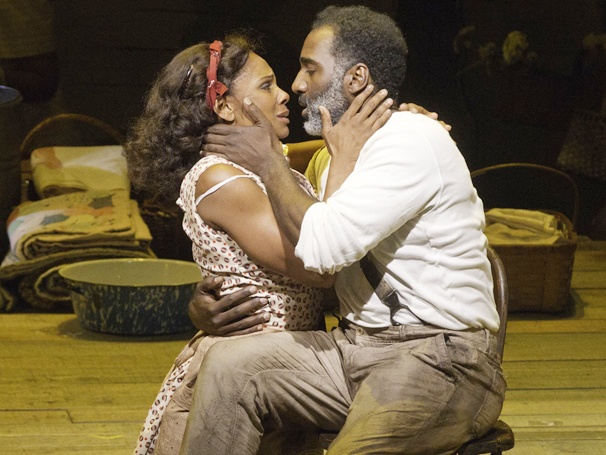Review: The Gershwins' Porgy and Bess
 |
| Audra McDonald and Norm Lewis in The Gershwins' Porgy and Bess |
After more press than any other revival this season, The Gershwins’ Porgy and Bess makes a triumphant return to Broadway in Diane Paulus’ reconceived staging. Although certain changes made to the classic are up for debate, there is no denying this is a true American masterpiece with a bevy of strong performances led by the truly extraordinary Audra McDonald.
For those who don’t know, Porgy and Bess is set in South Carolina’s fictional Catfish Row, an African-American community in the late 1930s. The show traces the love story between the crippled beggar Porgy and the town’s drug-addicted outcast, Bess. Originally an opera, this version recasts the work as a more traditional musical, with dialogue scenes replacing many of the recitative sections. While Paulus and new bookwriter Suzan-Lori Parks have altered or added some minor plot details, purists can rest assured that this is a fairly faithful adaptation of George Gershwin’s magnum opus, and leaves all of the most famous songs, like “Summertime” and “I Got Plenty of Nothing,” intact.
One thing Paulus’ production does startlingly well is create a genuine sense of danger, something rarely achieved in musical theatre. Even those who know the story will experience an uneasiness during the show’s more dramatic scenes, which often spiral out of control into an engrossing chaos. This is most evident during the second act, particularly the climactic storm scene and Porgy’s final confrontation with Crown, the outcome of which drew well-earned cheers from the audience at the performance I saw. Paulus highlights the material’s dark undertones, and barring a couple of minor hiccups successfully marries the opera’s grand scale with believable and grounded emotions.
The production design definitely helps bridge the gap between these two disparate styles. Riccardo Hernandez’s set is suitably operatic in scale, but peppered with enough small details to keep Catfish Row feeling like a real location. He evokes a large variety of locations with minimal set dressing, and his narrowing of the proscenium opening during key scenes intensifies the show’s drama. ESosa’s costumes have an everyday beauty about them, and their commonplace appearance makes every character feel real. Meanwhile, the dramatic lighting design by Christopher Akerlind emphasizes the larger than life aspects of the story, and is a perfect contrast to the more subdued costumes.
The cast is led by the incomparable Audra McDonald, making her triumphant return to Broadway after four years on ABC’s Private Practice. Words cannot express my joy at having McDonald, arguably the greatest singing actress working today, back on Broadway after this extended absence. And while I don’t have the necessary points of comparison to call her the best Bess ever, I can certainly tell you that her searing portrayal is one of the most full-bodied performances to grace the musical stage in years. McDonald completely inhabits Bess, conveying more with a single look than most actresses can with pages of dialogue. One of her most memorable scenes is entirely silent, as you watch Bess struggle against the supreme temptation offered by dope-dealer Sporting Life and his “happy dust” late in Act II. McDonald’s Bess is a woman who has made all the wrong choices and is struggling to better herself, but simply cannot overcome the vicious cycle of abuse in which she finds herself trapped. From the moment she steps onstage until her final exit, McDonald is utterly mesmerizing, and listening to her full-voiced soprano sing Gershwin’s soaring melodies is as close to heaven as you’re likely to find in a Broadway theatre.
While Norm Lewis’ Porgy isn’t quite on McDonald’s level, he still makes for an excellent leading man. He has mastered the physicality of this disabled beggar, and plays Porgy with an unending optimism and quiet strength that is utterly endearing. Lewis’ glorious baritone sounds fantastic on these classic songs, particularly his thrillingly sung rendition of “I Got Plenty O Nothing.” His two duets with McDonald are the show’s most transcendent, filled with the deeply felt love often talked about but rarely seen in Broadway musicals. And his performance of the show’s finale moved even this jaded critic, so earnest and pure was his love for Bess. (It should be noted that Paulus and Parks have restored the show’s original ending after experimenting with alternate versions out of town, which prompted Stephen Sondheim’s famous critique in the NY Times.)
There is solid work from much of the supporting cast, including Joshua Henry as Jake and Nikki Renee Daniels as Clara. Phillip Boykin makes a truly fearsome villain as Crown, coupling his commanding stage presence with a glorious baritone voice. The only disappointment is David Alan Grier as Sporting Life. While Grier does just fine with Life’s big number, “It Ain’t Necessarily So,” he is the only one of the principals who doesn’t seem to fully understand his character’s motivations. In some scenes he plays a harmless goof and in others he attempts something darker and more sinister, although it is never clear to the audience what’s prompting these changes. He repeatedly talks about life in New York City, but never really gives the indication that he intends for Bess to come with him, which makes the final scene between the pair a little tough to swallow.
Overall, this Porgy and Bess largely succeeds in its intended purpose. It definitely makes this classic more accessible to a Broadway audience, who may not have the patience to fully appreciate Gershwin’s magnificent opera. It is a highly entertaining drama, wonderfully sung, and is the perfect vehicle to welcome Audra McDonald back to Broadway. Here’s hoping we don’t have to wait another four years for her to return.
No comments:
Post a Comment